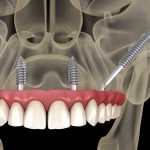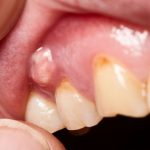Oral cancer affects more than 700 Quebeckers every year. It’s important for people to be informed about its causes so that those at risk have a better chance of preventing it. Our maxillofacial clinic in Montreal is committed to providing advice and helping our patients adopt good habits so that they can maintain excellent oral health.
In this article, the experts at Clinique MFML present an overview of oral cancer, including:
- Types of oral cancer and those most likely to be affected
- Oral cancer risk factors
- Strategies for oral cancer prevention
- Oral cancer treatments
Types of oral cancer
Oral cancer can be found in different parts of the oral cavity. There are certain habits that increase the likelihood that oral cancer will develop.
Gum cancer is usually the result of excessive tobacco or alcohol consumption. Cancer can also develop on the floor of the mouth, in which case the mandible will also likely be affected.
More rarely, cancer can develop on the hard palate. This type of oral cancer is often the result of consuming both tobacco and alcohol, and men are more susceptible to it than women.
The most common type of oral cancer affects the tongue. It is often detected late because the symptoms tend not to appear until the cancer reaches an advanced stage.
Finally, tonsil cancer accounts for 15% of head and neck cancers. It is usually caused by HPV infection.
Who is likely to develop oral cancer?
Oral cancer is the 6th most common cancer in the world. It affects adults over the age of 55 in 66% of cases. Only 12.5% of cases occur in people under the age of 50.
That being said, young people are certainly not immune, particularly when it comes to tonsil cancer, which is often caused by HPV infection.
Generally speaking, men are more likely to develop oral cancer. This is at least partly due to the fact that men tend to drink and smoke more than women.
6 common causes of oral cancer
There are a variety of risk factors that can cause oral cancer. According to the Canadian Cancer Society, some of the known risk factors for this oral pathology are:
- Smoking and drinking alcohol
- Poor oral health
- Previous cancer diagnosis
- Family history of squamous cell carcinoma (the most common type of oral cancer)
- Sun exposure
- Human papillomavirus (HPV)
Knowing the causes and symptoms of oral cancer makes it easier for those at risk to take preventive measures to limit their chances of developing the disease.
4 strategies for oral cancer prevention
If you think you may be at risk of developing oral cancer, there are habits you can adopt to try to prevent it. Here are a few of them.
1. Maintain good oral hygiene and get regular oral exams
Following our oral hygiene instructions will help keep your mouth and teeth healthy. Brush your teeth after meals and before bed, and floss daily.
It’s also important to visit a dentist regularly for a full oral exam. With technology like 3D radiology, dentists can detect any abnormalities that may be related to oral cancer and refer you to an oral and maxillofacial specialist for treatment.
Even if you wear a full set of dentures, it’s important to visit your dentist periodically. Oral cancer can also occur in the gums and soft tissues of the mouth.
2. Limit alcohol consumption and smoking
As mentioned above, smoking and drinking alcohol significantly increase your risk of developing oral cancer. Therefore, we strongly recommend that you quit smoking (and any other tobacco consumption) and limit your alcohol consumption as much as possible in order to reduce your risk of developing oral cancer.
3. Protect yourself from the sun
Oral cancer includes cancer of the lip. Like the rest of your skin, your lips are sensitive to the sun’s rays. It’s important to protect them to avoid the serious consequences of prolonged exposure.
Apply a lip balm with SPF when you’re going to be out in the sun. It’s also a good idea to wear a wide-brimmed hat and keep to the shade when the sun is at its strongest.
4. Eat lots of fruit and vegetables
Fruits and vegetables are good for your health in general, but they have an added benefit when it comes to preventing oral cancer.
Fruits and vegetables, particularly those that are yellow, orange or dark green, contain carotenoids. Carotenoids are antioxidants that have been shown to limit the damage to cells in the mouth, reducing the risk of oral cancer.
The 3 types of oral cancer treatments
Oral cancer treatments are divided into three categories:
- Surgery: The cancer cells and surrounding tissues are removed to ensure that the cancer is completely eliminated.
- Radiation therapy: The cancer cells are destroyed by high-energy beams of radiation.
- Chemotherapy: Drugs containing powerful chemicals are administered in order to attack and kill the cancer cells.
In most cases, treatments are combined to maximize their effectiveness. Surgery may be followed by radiation therapy to prevent the cancer from returning.
The treatments are also intended to preserve the mouth’s main functions (breathing, speaking, eating) and appearance.
Clinique MFML: Oral pathology specialists in Montreal
Oral cancer is a serious disease. It’s important to know what the risk factors are in order to have a better chance of preventing it. Changing certain lifestyle habits can greatly reduce your risk of developing the disease.
If you ever notice signs and symptoms of oral cancer, don’t hesitate to contact Clinique MFML. Our maxillofacial surgeons are experts at detecting and treating oral pathologies.




